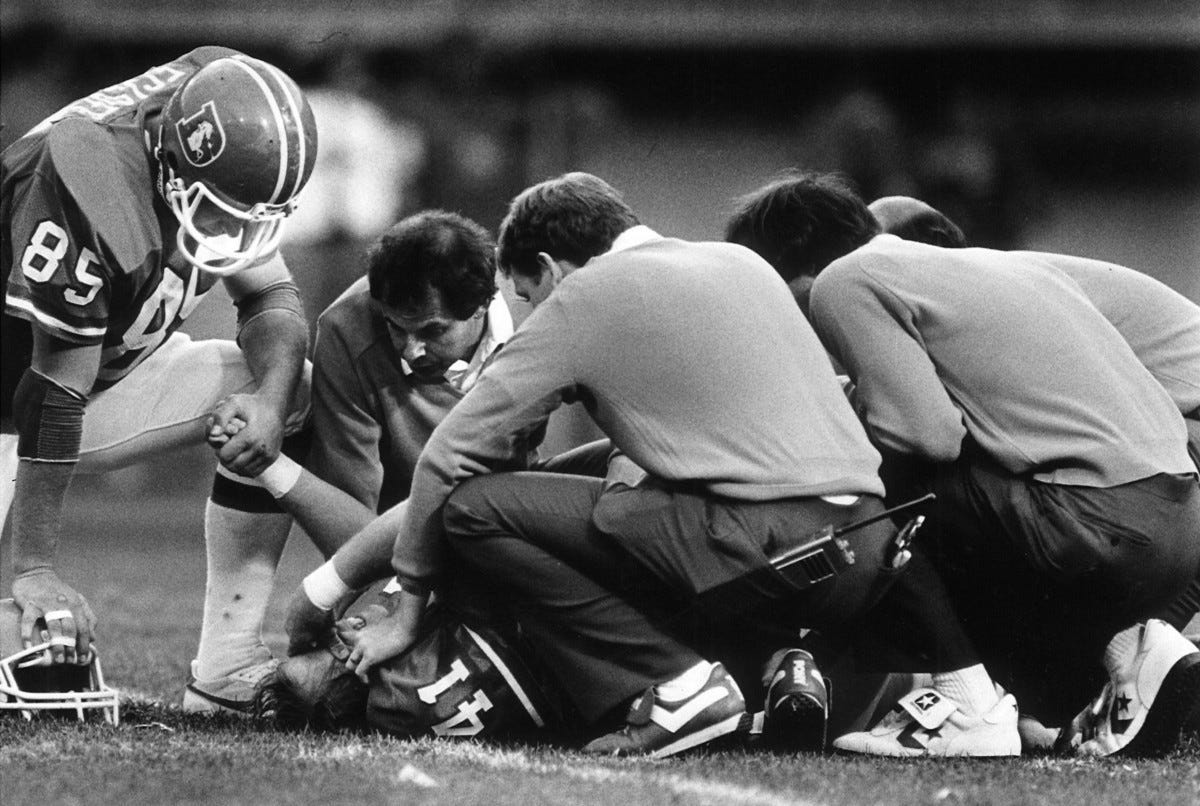Author’s Note & Background
My dad, former Michigan All-American and Denver Broncos running back Rob Lytle, was inducted posthumously into the College Football Hall of Fame in December 2015. The honor was bittersweet for our family. On one hand, a touching tribute to Dad’s love for football and the spirit with which he played the game. On the other, a cruel reminder of football’s violence and the calamity it can cause families.
At the Hall of Fame induction ceremony, NFL Commissioner Roger Goodell laughed at a joke mocking football’s head trauma crisis. Dad had suffered ‘double-digit’ concussions while playing, was an early brain diagnosed with CTE, and his heart gave out in 2010 at just 56 after too many beats pumping upstream against the trauma he’d endured on the gridiron.
This is the story of how our family felt that evening (note: I originally published this in February 2016).
The Night Roger Goodell Made My Mom Cry
Roger Goodell, his black bowtie snug to his neck, beamed. His tailored tuxedo jacket broke at his shoulders, which bounced in sync with his amusement. Former Dallas Cowboys quarterback Roger Staubach, presenting at the National Football Foundation’s Annual Awards Dinner on Dec. 8, had just quipped: “I had a chance to sit next to the commissioner of football, Pete Rozelle tonight … Oh, excuse me, Roger Goodell. I apologize. I had six concussions in the NFL.”
Unease rose from the more than 1,500 people seated inside the Waldorf-Astoria’s Grand Ballroom, but Goodell, undaunted, broadened his smile and intensified his laughter. It was tasteless, smug arrogance from the self-professed protector of the shield, a boardroom champion elected to his post by win-at-all-costs NFL owners.
Seated at a table less than thirty-yards from Goodell, I slugged half of my glass of red table wine, swallowed, and pursed my purple-stained lips. The cocktail party humor had hit home, and the offensive reaction from football’s vile prophet had struck a nerve.
I scanned the dais, moving through 16 Hall of Fame faces, national champions, and Heisman Trophy winners. Football legends seated at the head table; men who limp and cringe with simple steps. Academic All-Americans flanked their sides, as did heroes from our nation’s service academies — the evening’s Distinguished American Award winners. Condoleezza Rice sat waiting her turn to speak as the recipient of the National Football Foundation’s Gold Medal award. My eyes swept past these faces and zeroed in on my mother. As the crowd’s laughter faded, hers was the reaction I sought.
Mom was sitting on the dais in honor of her late husband, College Football Hall of Fame inductee Rob Lytle. Dad had starred at the University of Michigan from 1974–1976, leaving as the school’s all-time leader in rushing yards, and finishing third in voting for the Heisman Trophy in 1976.
Legendary Wolverines head coach Bo Schembechler called him the “toughest player” he ever coached. His teammates said he was the most humble teammate they ever had.
Following Michigan, Dad played for the Denver Broncos, becoming the first player to score a touchdown in the Rose Bowl and the Super Bowl. Dad retired in 1984 after seven pro seasons and a smorgasbord of injuries, including — in his words — double-digit concussions.
On Nov. 20, 2010, Dad suffered a massive heart attack and died. He was 56 years old.
Mom and Dad began dating in high school and Mom, as much as anyone on the Waldorf’s stage, had earned her seat. She earned it by caring for — and carrying — Dad in life before, during, and after his career. She had enjoyed the good days, when Dad racked up yards in Michigan’s steamrolling rushing attacks in the mid-seventies. With his sandy blonde hair and easy smile, Dad was everybody’s All-American.
Mom earned her seat in the bad days, too, the tear-filled Sundays she spent tucked into a corner seat at the mile-high point of Denver’s Mile High Stadium. “Catch the ball … Lytle, you bum … Run harder!” The fans’ disappointment accelerated with each season. Mom hid where she could to avoid the insults.
What fans never saw, though, was how Dad was an invalid during the week and transformed into a warrior on Sundays by fixing a cocktail of cortisone, painkillers, adrenaline, and his obsession to play football. Or how, as the toll of injuries overwhelmed his skills, Dad would spend his off days alone in dark rooms, paralyzed emotionally by his fading football career. Mom would drag him from the house and force him to see a life with more than football.
Mom earned her spot on the dais in the dark days. These were the years after Dad retired, when he summoned all his ex-athlete bravado to charm his way through the day only to sit on his living room couch crying into the night. Mom wrapped her arms around him, held his head, and let him weep over losing the game that had been his life’s driving purpose while Barbara Streisand played from an antique record player over the memories of lost days in the sun.
Dad thought himself nothing without football. Mom showed him he could be more.
And Mom earned her place in Dad’s final days, when the toll of nearly 30 operations, the concussions, and thousands of on-field collisions squeezed the last beats from his heart. When vertigo rendered Dad lost and confused at the grocery store he had been visiting since childhood, Mom rescued him. She helped him schedule meetings, monitor appointments, and lift his spirit.
Doctors would posthumously diagnose Dad with moderate to severe chronic traumatic encephalopathy (CTE). When he died in 2010, our family knew nothing about CTE. Now, as a son, I own a stomach of guilt for not doing enough to help Mom or Dad in those final years.
Mom and Dad were a team for 40 years, from a first kiss near a pool table in her family’s basement to a final goodbye in a hospital room. She had earned her right to celebrate the accomplishments her husband achieved playing the sport that killed him.
Roger Goodell never played football after high school. He just made himself comfortable wearing a suit on NFL sidelines.
I watched Mom closely as the ceremony continued. Mom is a petite fighter with an inexhaustible will to serve others. Some have described her as a “saint;” most others claim she is the “kindest person in the world.” She taught elementary school for almost 30 years. Caring and compassion ruled her classroom. It was a place where young lives entered and left transformed for the better.
Throughout the Hall of Fame events, Mom had worn a practiced smile — part genuine and part bittersweet. She had glowed earlier in the program, awed by the honor for her husband, and cherishing the memories they had formed together. Now, I watched her eyes burn into the NFL Commissioner sitting not more than two first downs from her. Goodell’s laughter had disrespected all former players and families who have had their lives altered by CTE.
Mom seethed and, as I learned later, debated whether to leave the ceremony. Her smile fled, but her composure remained. She sighed and forced back tears. Later, Mom remarked:
“I thought, if you (Goodell) only knew how Rob and so many others loved your game…and if you ever felt for one second their pain, you wouldn’t be smiling. You wouldn’t be laughing. And then, despite being furious, I felt sad. Not for your dad or myself. But sad over my disappointment in Goodell…that he doesn’t care…that he could never know just how much people like Rob and others love this sport…and sad for football itself. The game has a long way to go to fix its problems.”
Friends- football is a violent yet beautiful game and my dad dearly loved the sport. Roger Goodell, well, I have nothing positive to say about him.
We love you, and we’ll see you when we see you.
PS- As a reminder, my book To Dad, From Kelly, shares personal reflections on Dad’s life, death, and lasting legacy.















Share this post